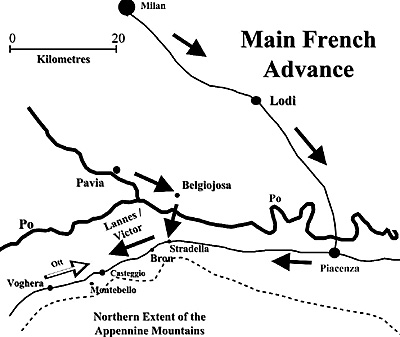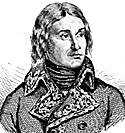Battle of Casteggio - Montebello
9th June 1800
Introduction
by Dave Hollins, UK
| |
Fresh back from Egypt, General Napoleon Bonaparte had seized political power in the coup d'etat of 18 Brumaire An VIII (8th/9th November 1799). From early January 1800, the Army of the Reserve was assembled to drive the Austrians out of Italy and secure Bonaparte's rule in France. Its veteran units moved through Dijon to assemble north of Lake Geneva between Geneva and Martingy, as the conscript formations assembled in Dijon itself. In north-west Italy, the Austrians under General der Kavallerie Michael Melas moved to attack the last French outpost in Italy - Genoa - in early April, although Massena's dogged resistance meant that it would be another two months before the city fell. As the Austrians then concentrated first around Turin and then Alessandria, a key fortress city on the Turin-Mantua hard surface road, Bonaparte had crossed the St. Bernard and other passes in mid-May. From there, he marched to take Milan on 2nd June.
His next target was Stradella, the narrowest defile between the great Po River and the Apennine Mountains to the south. This would be both a good, defensible position and cut the Turin-Mantua road, Melas's primary line of communication and supply. From there, Bonaparte intended to attack Melas, whom he expected to meet on the flat plain east of Alessandria, bounded by the Bormida, Tanaro and Scrivia rivers. The main crossing of the Po was at Piacenza, which was attacked by Murat on 5th June. FML O'Reilly had been dispatched with a light force by Melas to help out. Despite determined Austrian resistance, the crossing was secured by the French on the 7th.
Unknown to the French, in a last bid to reinforce Piacenza, on 6th June the Austrian commander, GdK Melas had ordered Ott's division to cross the Scrivia and march up the main road towards the city. Ott, who had been marching up from Genoa, was delayed by the rising Scrivia and only reached Voghera on 8th June. O'Reilly had withdrawn his command from Piacenza and retreated east as Lannes pressed his left wing and threatened to cut him off from the main army. Bonaparte had also told Berthier that Ott only had 9,000 troops, when in reality, combined with O'Reilly, his force would number about 15,000.
At 0600 on 9th June, Général Gency led forward the 6è Légère down the main road towards Casteggio to scout for the Austrian outposts, which they found at the villa of San Guiletta. After probing the Austrian pickets and engaging in a brief clash to ascertain their strength, the French éclaireurs fell back to report. Likewise, O'Reilly sent a despatch to Ott at Voghera , informing him that the enemy advancing on him numbered about 6,000 men. That morning, the Austrian Chief of Staff, Generalmajor Anton von Zach had arrived from Turin and was surprised to hear that the French had not only crossed the Po, but that they had advanced so far. If the French were probing aggressively, then behind their screen was probably a substantial force.
Zach argued against getting involved in any clash against an enemy whose strength was unknown. Backed by his own staff, Ott disagreed, replying: "My forward posts are attacked, I march to their assistance." Behaving more like the Hussar he had been, than a commanding General, Ott planned to concentrate, throw back the apparently small enemy force and relieve Piacenza.
 More Battle of Casteggio-Montebello 9th June 1800
Outpost Clashes East of Casteggio 1400: The Second French Line Arrives French Evening Advance to Montebello Order of Battle Back to Table of Contents -- First Empire #53 Back to First Empire List of Issues Back to MagWeb Master Magazine List © Copyright 2000 by First Empire. This article appears in MagWeb (Magazine Web) on the Internet World Wide Web. Other military history articles and gaming articles are available at http://www.magweb.com |
 In the interim, Lt-General Lannes (at right) had crossed the Po farther west and secured Stradella on the 7th. From there he marched the short distance to Broni on the 8th. Général Berthier, formally in command of the army had been confidently assured by Bonaparte (formally only present with his Guard as First Consul, but commanding in reality) that the Austrians were concentrating at Alessandria. Bonaparte pressed for the Advance-guard under Lannes to march on to Voghera as no significant force was anticipated ahead of them. Voghera was the entrance point to the wide plain, which extended westwards across to Alessandria. Berthier had ordered Lannes to drive on as far Casteggio on the morning of 9th June. On that day, Lannes was further ordered to advance to Casteggio and wait there for Victor with Chambarlac's Division, before marching to Voghera on the 10th. The constant rain had flooded the Po, so that it became impossible to cross it from directly opposite Stradella. Instead, Monnier's Division and the cavalry had been diverted south-east from Milan to Piacenza to cross the bridge there. This meant that Lannes and Victor were in an exposed position, the nearest supports being about a day's march behind. The French command were unconcerned.
In the interim, Lt-General Lannes (at right) had crossed the Po farther west and secured Stradella on the 7th. From there he marched the short distance to Broni on the 8th. Général Berthier, formally in command of the army had been confidently assured by Bonaparte (formally only present with his Guard as First Consul, but commanding in reality) that the Austrians were concentrating at Alessandria. Bonaparte pressed for the Advance-guard under Lannes to march on to Voghera as no significant force was anticipated ahead of them. Voghera was the entrance point to the wide plain, which extended westwards across to Alessandria. Berthier had ordered Lannes to drive on as far Casteggio on the morning of 9th June. On that day, Lannes was further ordered to advance to Casteggio and wait there for Victor with Chambarlac's Division, before marching to Voghera on the 10th. The constant rain had flooded the Po, so that it became impossible to cross it from directly opposite Stradella. Instead, Monnier's Division and the cavalry had been diverted south-east from Milan to Piacenza to cross the bridge there. This meant that Lannes and Victor were in an exposed position, the nearest supports being about a day's march behind. The French command were unconcerned.